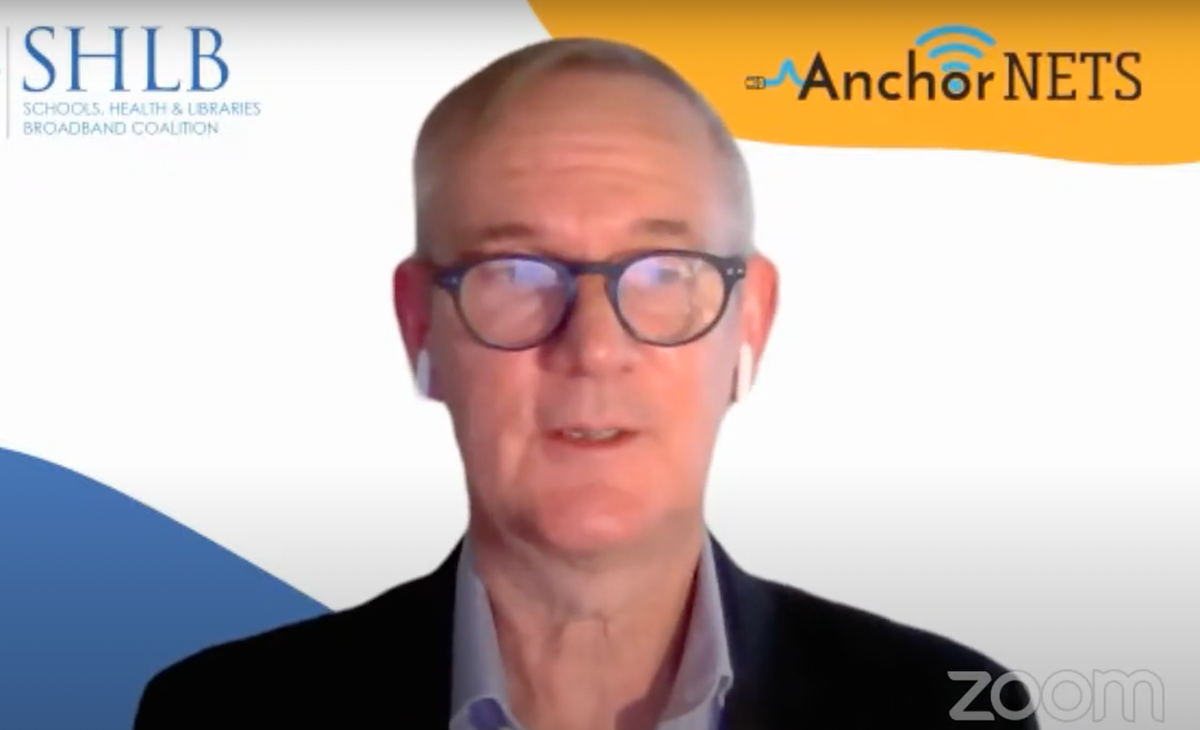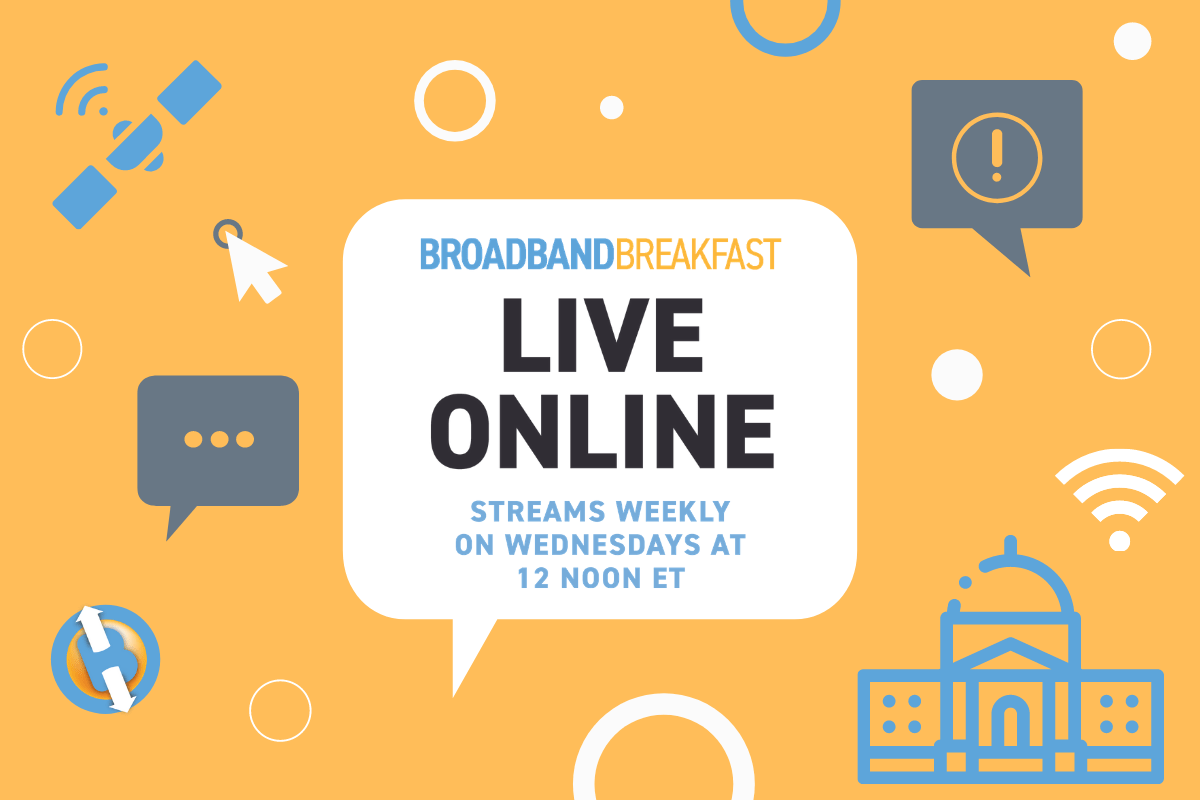Industry Optimistic About Calls for a Targeted ‘Buy America’ Waiver Ahead of Broadband Awards
Strict domestic manufacturing requirements may hinder the success of the $42.5 billion BEAD Program.

WASHINGTON, May 19, 2023 — With the announcement of state funding allocation decisions from the $42.5 billion Broadband Equity, Access and Deployment Program expected by the end of June, industry experts are reiterating calls for certain domestic production requirements to be waived, pointing to significant supply chain challenges.
The goals of the Build America, Buy America Act are admirable, but they are not realistic within the limited time frame of the BEAD Program, argued John Windhausen, executive director of the SHLB Coalition, at a Broadband Breakfast live online event on Wednesday

“While there seems to be enough domestic fiber optic cable to connect communities, the electronic components such as the routers, switches and semiconductors that transform those glass strands into data highways are made mainly in other countries,” Windhausen said.
Under the Buy America requirements, all manufactured products used in federally funded projects must be domestically produced. In addition, the cost of components that are mined, produced or manufactured in the U.S. must make up more than 55 percent of the total cost of the product’s components.
“It’s a really, really high bar for a lot of these products, which are sourced from inputs that come from all over the world — it’s fundamentally a global industry,” said Patrick Lozada, director of global policy for the Telecommunications Industry Association.
The NTIA in April finalized an exemption to certain domestic manufacturing requirements for the $1 billion Middle Mile Grant Program, saying that “although there are public and private efforts underway to increase manufacturing capacity… industry will not be able to address shortages of the manufactured products and construction materials required for middle mile network deployment within the timeframes required.”
The waiver noted that just 12 percent of global semiconductor production occurs in the U.S., with more than 70 percent of production taking place in Asia. New semiconductor fabrication facilities in the U.S. will take at least three years to build, according to industry estimates.
This problem is also relevant to the BEAD Program, said Pam Arluk, vice president and associate general counsel for NCTA – The Internet & Television Association.
“The estimates are that it would take at least, at a minimum, three to five years to bring a semiconductor chip plant to the U.S.,” Arluk explained. “And even though the BEAD program is going to be over several years, that’s still just not enough time.”
Several trade groups and service providers have urged the NTIA to issue a similar waiver for the BEAD Program, claiming that projects will encounter the same procurement problems. In fact, Windhausen argued, the justification for waiving domestic manufacturing rules “applies equally well, if not more so” to BEAD because of the program’s focus on last mile deployment.
“We’re trying to build broadband to those areas that are the highest cost, that are the hardest to reach, and if anything, we want to be encouraging more organizations to apply for these BEAD funds,” he said. “But a strict adherence to the Buy America provisions would discourage organizations from applying for that funding… It’s kind of counterproductive to the whole goal.”
As federal agencies navigate the conflicting priorities of encouraging domestic manufacturing and closing the digital divide, Lozada suggested that one potential solution is to rely on stable allies such as Mexico and Canada.
Windhausen also highlighted efforts such as the CHIPS and Science Act, which he said presented “a better and more targeted way to increase our domestic production capabilities than imposing a Build America Buy America requirement on the buildout of these new broadband networks in the short run.”
Our Broadband Breakfast Live Online events take place on Wednesday at 12 Noon ET. Watch the event on Broadband Breakfast, or REGISTER HERE to join the conversation.

Wednesday, May 17, 2023, 12 Noon ET – The Ongoing Impact of Buy America Rules
The Biden administration’s historic investments in semiconductor manufacturing, green energy and broadband infrastructure have the potential to dramatically restructure the American industrial base in the coming years. But some industry leaders have warned that the domestic content procurement preferences for all federally subsidized infrastructure projects — as required by the Build America Buy America Act of 2021 — could lead to higher prices and significant supply chain problems. What impact have Buy America rules had so far, and how will they shape the future of U.S. infrastructure development?
This Broadband Breakfast Live Online session will preview the upcoming Made in America Summit, taking place on Tuesday, June 27 in Washington.
Panelists
- John Windhausen, Executive Director, SHLB Coalition
- Pam Arluk, Vice President and Associate General Counsel, NCTA – The Internet & Television Association
- Patrick Lozada, Director of Global Policy, Telecommunications Industry Association
- Drew Clark (moderator), Editor and Publisher, Broadband Breakfast

John Windhausen Jr. founded the SHLB Coalition in 2009 with the support of the Bill & Melinda Gates Foundation. As executive director, he spearheads SHLB’s membership growth and shapes its broadband policy recommendations. Previously, he served as president of the Association for Local Telecommunications Services, spent nine years on Capitol Hill, and started his career as a staff attorney at the FCC. In 2012, John was named the Community Broadband Hero of the Year by the National Association of Telecommunications Officers and Advisors.
Pam Arluk is vice president and associate general counsel of NCTA, in which she represents the cable industry on a large range of matters before the FCC and NTIA related to voice and broadband issues. Prior to joining NCTA, Arluk was chief of the Competition Policy Division at the FCC’s Wireline Competition Bureau, which is the division responsible for the non-pricing policy rules involving wireline voice and broadband services, including infrastructure, open internet requirements, privacy, U.S. numbering policy, domestic transfers of control and discontinuance of service. Arluk graduated from Miami University and William & Mary Law School.
Patrick Lozada is the director of global policy at the Telecommunications Industry Association, the U.S.-based industry association representing the manufacturers and suppliers of telecommunications equipment and services. In this role, Patrick leads TIA’s work on issues related to trade, supply chains, and standardization policy. Prior to this role, Patrick was a director in the China Practice of the Albright Stonebridge Group and spent eight years in Asia, primarily advising U.S. firms on trade and policy issues.
Drew Clark (moderator) is CEO of Breakfast Media LLC. He has led the Broadband Breakfast community since 2008. An early proponent of better broadband, better lives, he initially founded the Broadband Census crowdsourcing campaign for broadband data. As Editor and Publisher, Clark presides over the leading media company advocating for higher-capacity internet everywhere through topical, timely and intelligent coverage. Clark also served as head of the Partnership for a Connected Illinois, a state broadband initiative.

Photo by Joanne Dale/Adobe Stock used with permission
WATCH HERE, or on YouTube, Twitter and Facebook.

As with all Broadband Breakfast Live Online events, the FREE webcasts will take place at 12 Noon ET on Wednesday.
SUBSCRIBE to the Broadband Breakfast YouTube channel. That way, you will be notified when events go live. Watch on YouTube, Twitter and Facebook.
See a complete list of upcoming and past Broadband Breakfast Live Online events.










